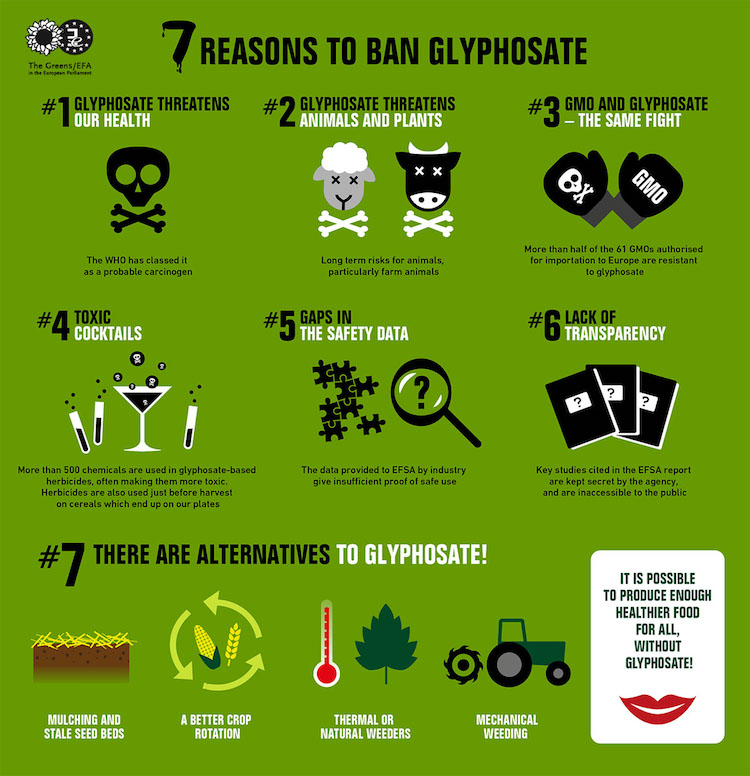EU: Results of Glyphosate Pee Test Are In ‘and It’s Not Good News’
EUROPE, 16 May 2016
Lorraine Chow | EcoWatch – TRANSCEND Media Service
12 May 2016 – Last month, Members of the European Parliament (MEPs) volunteered to take a urine test to see if glyphosate—the cancer-linked weedkiller—is in their system. Forty-eight MEPs from 13 different European Union countries participated in the test, and now the results are in.
https://twitter.com/aw_bell/status/723463280333864960/photo/1?ref_src=twsrc^tfw
According to ELISA test results from the accredited Biocheck Laboratory in Germany: “All participants excreted glyphosate by urine.”
The experiment was spearheaded by the Green Party in the European Parliament, which wants a ban on the controversial herbicide in the European Union.
The group noted in a press release of their so-called “#MEPee” test:
On average, the MEPs had 1.7 micrograms/liter of glyphosate in their urine, 17 times higher than the European drinking water norm (0.1 microgram/litre). This means that everyone we tested was way above the limit for residues of pesticides in drinking water.
Of the 48 participants, EU-parliament members from Belgium, France and Germany made up more than 80 percent of the whole investigated participants. The test showed that EU-parliament members from Lithuania, Spain and Croatia had the highest concentrations of glyphosate. The lowest concentrations were in the urines of participants of from Italy, Finland and Ireland.
“Nevertheless all investigated EU-parliament members were glyphosate contaminated. This will show glyphosate is also in the food chain of members of the EU-parliament,” the report states.
Glyphosate, which the World Health Organization’s International Agency for Research on Cancer (IARC) declared a possible carcinogen last March, is the main ingredient in Monsanto’s widely used weedkiller, Roundup. It is also found in herbicides manufactured by Syngenta and Dow.
The Greens conducted the test ahead of European Parliament’s April 13 resolution that opposed the European Union’s relicensing of glyphosate.
https://twitter.com/GreensEP/status/730710450728513537/photo/1?ref_src=twsrc^tfw
Despite fierce opposition from European Parliament, countries such as France, Sweden, Italy and the Netherlands, and the 1.4 million people who have signed a petition calling on an EU ban, the European Commission—the executive body of the European Union—reportedly plans to relicense glyphosate for nine years.
According to the Green Party, the European Commission’s latest proposal, which will be voted on May 19, will “plough ahead with a full-fledged approval of glyphosate’s license for nine years.”
“It considers only symbolically if at all the European Parliament’s resolution calling for a very limited scope of approval. Responsibility for the protection of operators and for multiple risks is discharged onto Member States in a non-legally binding manner,” the party said. “We are pissed off that our governments want to allow this poison for another nine years! No politician should have this in his or her body, and not a single citizen either!”
Glyphosate approval in the EU expires at the end of June. The chemical has been the subject of incredible controversy in Europe especially after the European Food Safety Authority famously rejected the IARC’s classification of glyphosate as a possible carcinogen in November.
Agri-business giant Monsanto has also vehemently denied glyphosate’s health and cancer risks and demanded a retraction of the IARC report.
The Green Party’s MEPee test was inspired by a German study “Urinale 2015,” which sampled glyphosate concentrations in urine from more than 2,000 participants.
“The study found that the scale of the glyphosate problem is enormous, with detected concentrations in urine between five and 42 times over the maximum value of residues for drinking water in Europe,” the Green Party pointed out. “No less than 99.6 percent of all citizens who took part in this survey had higher residue levels. This means that virtually all citizens are contaminated with glyphosate.”
A number of other studies have detected glyphosate—the “most widely applied pesticide worldwide”—in feminine hygiene products, everyday food items and, yes, human bodies. A 2013 Friends of the Earth Europe study reported people in 18 European countries have traces of glyphosate in their urine.
______________________________________
YOU MIGHT ALSO LIKE
Monsanto Faces Rejection in U.S. Over GMO Soybean
‘Mistaken’ Release of Glyphosate Report Raises Questions Over EPA’s Ties to Monsanto
How Widespread Is the Use of Glyphosate in Our Food Supply?
DISCLAIMER: The statements, views and opinions expressed in pieces republished here are solely those of the authors and do not necessarily represent those of TMS. In accordance with title 17 U.S.C. section 107, this material is distributed without profit to those who have expressed a prior interest in receiving the included information for research and educational purposes. TMS has no affiliation whatsoever with the originator of this article nor is TMS endorsed or sponsored by the originator. “GO TO ORIGINAL” links are provided as a convenience to our readers and allow for verification of authenticity. However, as originating pages are often updated by their originating host sites, the versions posted may not match the versions our readers view when clicking the “GO TO ORIGINAL” links. This site contains copyrighted material the use of which has not always been specifically authorized by the copyright owner. We are making such material available in our efforts to advance understanding of environmental, political, human rights, economic, democracy, scientific, and social justice issues, etc. We believe this constitutes a ‘fair use’ of any such copyrighted material as provided for in section 107 of the US Copyright Law. In accordance with Title 17 U.S.C. Section 107, the material on this site is distributed without profit to those who have expressed a prior interest in receiving the included information for research and educational purposes. For more information go to: http://www.law.cornell.edu/uscode/17/107.shtml. If you wish to use copyrighted material from this site for purposes of your own that go beyond ‘fair use’, you must obtain permission from the copyright owner.
